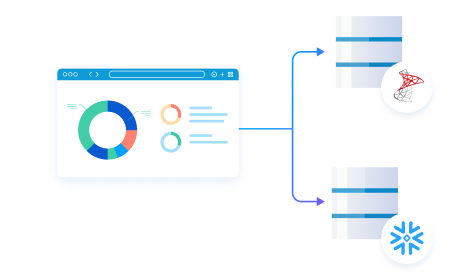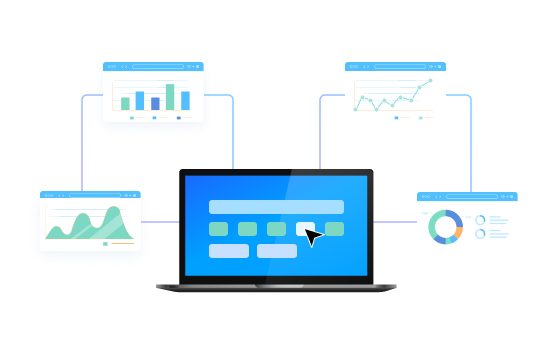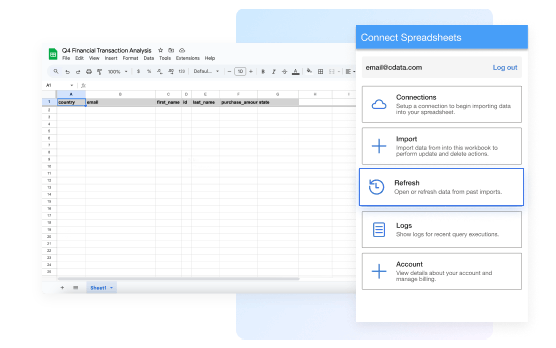Discover how a bimodal integration strategy can address the major data management challenges facing your organization today.
Get the Report →
Salesforce Marketing drivers & connectors
for data integration
Connect to Salesforce Marketing Cloud through easy-to-use, bi-directional drivers. Easily integrate Salesforce Marketing data with BI, reporting, analytics, ETL tools, and custom solutions.
Do more with Salesforce Marketing data
Salesforce Marketing data integration
Access Salesforce Marketing data in all of the systems you use every day, including BI & analytics tools, databases, data warehouses, and custom apps. Customers commonly use CData's Salesforce Marketing connectivity to:
- Provide a logical data layer of abstraction that shields users from the complexity of data access and integration.
- Get blazing-fast access to data for BI, reporting, and data integration with highly optimized read/write performance.
- Securely explore tables, columns, keys, data, and full meta-data based on user identity.
Try CData Salesforce Marketing Connectors

Trusted by Salesforce Marketing Users Worldwide
Office Depot Leverages CData to 'Lift and Shift' Critical Data and Enable Analytics Integration
“CData allows us to take that Snowflake data and put it in a cube with that sub-two second response time our end-users are looking for.”
— Daniel Ligas
Office Depot IT Architect
Read case study

Belden Supports Growing Marketing Requests by Centralizing Data Access in the Cloud
“CData connects our Tableau to Google Analytics, Google Ads, and Salesforce. Now we’ve also got connectors set up for Pardot, LinkedIn, Instagram, Facebook, and Twitter. And I have all these things all in one place with no upkeep on my end.”
— Paul Summitt
Belden D&A IT Supervisor
Read case study

Logi Analytics Brings Real-Time Data to Analytics Dashboards for SaaS
“As we expand into and serve new industries and markets, having broad-spectrum data connectivity within our products will improve our ability to support additional customers and data reporting scenarios”
— Jaimi Panini
VP of Product & Development for Logi Analytics
Read case study

The CData difference
Our standards-based approach to connectivity streamlines data access and insulates usrs from the complexities of integrating Salesforce Marketing data.
Unparalleled Salesforce Marketing Connectivity
Get full access to your Salesforce Marketing data wherever you need it. CData is the undisputed leader in Salesforce Marketing connectivity providing the most comprehensive access to live Salesforce Marketing data anywhere. Thousands of customers and hundreds of leading data ISVs rely on our connectivity to make the most of their data.
Fastest time to value
Reduce reducing development cycles and accelerating the overall time to market. Our pre-built, optimized connectors eliminate the need for complex custom development, allowing for fast, secure access to Workday data.
Unbeatable price-performance
By standardizing and streamlining how systems interact with Salesforce Marketing our products reduce development costs and timelines, slash architectural complexity.
Blazing data access
Our Salesforce Marketing connectivity is fast — really fast. In fact, over twice as fast as other solutions. Our engineers have optimized our drivers for maximum performance all the way down to the socket level, delivering truly exceptional data access.
Future-proof integration
We continuously test against changes in the Salesforce Marketing APIs & protocols used to connect, preventing downtime in your data and analytics processes.
Enterprise-class technical support
CData is dedicated to helping you find success with Salesforce Marketing. We work as an extension of your team to help solve your toughest data challenges. Thousands of customers and hundreds of ISVs rely on our services to make the most of their data.
Salesforce Marketing connectivity for BI & analytics
Live Salesforce Marketing access for analytics
Access Salesforce Marketing data in all of the systems you use every day, including BI & analytics tools, databases, data warehouses, and custom apps.
- Connect Salesforce Marketing (and any other data source) to your favorite analytics, automation, or data management app without moving data
- Bi-directional Salesforce Marketing connectivity through common data endpoints
- Enable Salesforce Marketing governability and data privacy with user-level permissioning at the source level.
Salesforce Marketing ETL, replication, & data warehousing
Automate Salesforce Marketing data replication
CData Sync automatically replicates data from hundreds of on-premises and cloud data sources — like Salesforce Marketing — to any modern database, data lake, or data warehouse.
- Create automated Salesforce Marketing data flows in minutes with point-and-click data replication
- Facilitate reporting, business intelligence, and analytics for decision support
- Archive data for disaster recovery

Consolidate Salesforce Marketing data management
Data management integration enables organizations to better manage their human resources data, optimize decision-making, and ensure compliance with data governance policies. Technologies like ODBC, JDBC, and ADO easily connect with all kinds of popular data management applications.
Connect Salesforce Marketing to data management systems to:
- Provide a single, accurate source of truth for employee and resource data.
- Ensure consistency, data quality, and integration across systems.
- Improve data discoverability, governance, and compliance, allowing for easy tracking, auditing, and efficient data use across the organization.
Connect Salesforce Marketing with no-code
Salesforce Marketing is often at the center of a wide range of repetitive tasks. With low-code/no-code tools, users can automate these tasks reducing manual effort and errors.
- Customize Salesforce Marketing and integrate it with other systems (like CRM, HR, or accounting software) without writing complex code.
- Create custom dashboards, reports, or data visualizations by integrating Salesforce Marketing data with other systems.

Build fully-integrated custom applications

From custom AI and analytics to performance managemement and learning platforms, developers are leveraging our drivers to power all kinds of real-time integrations with Salesforce Marketing.
What is a Salesforce Marketing driver?
A Salesforce Marketing driver is a software library that enables applications to interact with Salesforce Marketing as though it were a traditional database. These drivers simplify communication by abstracting API complexities, presenting Salesforce data in a structured, database-like format.
What is a Salesforce Marketing connector?
A Salesforce Marketing connector is a tailored integration designed to allow proprietary applications or unique systems to seamlessly interact with Salesforce Marketing. Built on the same robust engine as our Salesforce Marketing drivers, these connectors provide effortless real-time access to Salesforce Marketing data for extended application functionality.
How is developing with a Salesforce Marketing driver different?
Drivers streamline integration by abstracting Salesforce Marketing APIs, allowing you to access its data through standard interfaces like SQL, making them perfect for data-focused applications.
- Pragmatic API Integration: from SDKs to Data Drivers
- Data APIs: Gateway to Data Driven Operation & Digital Transformation
Embedding CData Connectivity
Virtualize access to Salesforce Marketing data
Data virtualization tools helps organizations achieve better data access, more agile decision-making, and greater efficiency in managing data across diverse systems.
Integrating Salesforce Marketing with data virtualization tools allows organizations to combine this data with other sources like ERP systems, CRM platforms, or financial databases without physically moving or duplicating data. This unified access enables faster, more efficient decision-making.
Connect to live Salesforce Marketing data in spreadsheets

Work with live Salesforce Marketing data seamlessly in Excel and Google Sheets.
- Always work with live Salesforce Marketing data — no more downloading, copying, and pasting
- Filter and get just the attributes and data you actually need
- Refresh data with a click or set a schedule
- Update Salesforce Marketing records right from your spreadsheet
Frequently asked Salesforce Marketing integration questions
Common questions about Salesforce Marketing drivers & connectors for data and analytics integration
How does the Salesforce Marketing Driver work?
The Salesforce Marketing driver acts like a bridge that facilitates communication between various applications and Salesforce Marketing, allowing the application to read data as if it were a relational database. The Salesforce Marketing driver abstracts the complexities of Salesforce Marketing APIs, authentication methods, and data types, making it simple for any application to connect to Salesforce Marketing data in real-time via standard SQL queries.
How is using the Salesforce Marketing Driver different than connecting to the Salesforce Marketing API?
Working with a Salesforce Marketing Driver is different than connecting with Salesforce Marketing through other means. Salesforce Marketing API integrations require technical experience from a software developer or IT resources. Additionally, due to the constant evolution of APIs and services, once you build your integration you have to constantly maintain Salesforce Marketing integration code moving forward.
By comparison, our Salesforce Marketing Drivers offer codeless access to live Salesforce Marketing data for both technical and non-technical users alike. Any user can install our drivers and begin working with live Salesforce Marketing data from any client application. Because our drivers conform to standard data interfaces like ODBC, JDBC, ADO.NET etc. they offer a consistent, maintenance-free interface to Salesforce Marketing data. We manage all of the complexities of Salesforce Marketing integration within each driver and deploy updated drivers as systems evolve so your applications continue to run seamlessly.
If you need truly zero-maintenance integration, check out connectivity to Salesforce Marketing via CData Connect Cloud. With Connect Cloud you can configure all of your data connectivity in one place and connect to Salesforce Marketing from any of the available Cloud Drivers and Client Applications. Connectivity to Salesforce Marketing is managed in the cloud, and you never have to worry about installing new drivers when Salesforce Marketing is updated.
How is a Salesforce Marketing Driver different than a Salesforce Marketing connector?
Many organizations draw attention to their library of connectors. After all, data connectivity is a core capability needed for applications to maximize their business value. However, it is essential to understand exactly what you are getting when evaluating connectivity. Some vendors are happy to offer connectors that implement basic proof-of-concept level connectivity. These connectors may highlight the possibilities of working with Salesforce Marketing, but often only provide a fraction of capability. Finding real value from these connectors usually requires additional IT or development resources.
Unlike these POC-quality connectors, every CData Salesforce Marketing driver offers full-featured Salesforce Marketing data connectivity. The CData Salesforce Marketing drivers support extensive Salesforce Marketing integration, providing access to all of the Salesforce Marketing data and meta-data needed by enterprise integration or analytics projects. Each driver contains a powerful embedded SQL engine that offers applications easy and high-performance access to all Salesforce Marketing data. In addition, our drivers offer robust authentication and security capabilities, allowing users to connect securely across a wide range of enterprise configurations. Compare drivers and connectors to read more about some of the benefits of CData's driver connectivity.
Is Salesforce Marketing SQL based?
With our drivers and connectors, every data source is essentially SQL-based. The CData Salesforce Marketing driver contains a full SQL-92 compliant engine that translates standard SQL queries into Salesforce Marketing API calls dynamically. Queries are parsed and optimized for each data source, pushing down as much of the request to Salesforce Marketing as possible. Any logic that can not be pushed to Salesforce Marketing is handled transparently client-side by the driver/connector engine. Ultimately, this means that Salesforce Marketing looks and acts exactly like a database to any client application or tool. Users can integrate live Salesforce Marketing connectivity with ANY software solution that can talk to a standard database.
What data can I access with the Salesforce Marketing driver?
What does Salesforce Marketing integrate with?
Using the CData Salesforce Marketing drivers and connectors, Salesforce Marketing can be easily integrated with almost any application. Any software or technology that can integrate with a database or connect with standards-based drivers like ODBC, JDBC, ADO.NET, etc., can use our drivers for live Salesforce Marketing data connectivity. Explore some of the more popular Salesforce Marketing data integrations online.
Additionally, since Salesforce Marketing supported by CData Connect Cloud, we enable all kinds of new Salesforce Marketing cloud integrations.
How can I enable Salesforce Marketing Analytics?
Salesforce Marketing Analytics and Salesforce Marketing Cloud BI integration is universally supported for BI and data science. In addition, CData provides native client connectors for popular analytics applications like Power BI, Tableau, and Excel that simplify Salesforce Marketing data integration. Additionally, native Python connectors are widely available for data science and data engineering projects that integrate seamlessly with popular tools like Pandas, SQLAlchemy, Dash, and Petl.
How can I support Salesforce Marketing Data Integration?
Salesforce Marketing data integration is typically enabled with CData Sync, a robust any-to-any data pipeline solution that is easy to set up, runs everywhere, and offers comprehensive enterprise-class features for data engineering. CData Sync makes it easy to replicate Salesforce Marketing data any database or data warehouse, and maintain parity between systems with automated incremental Salesforce Marketing replication. In addition, our Salesforce Marketing drivers and connectors can be easily embedded into a wide range of data integration tools to augment existing solutions.
Does Salesforce Marketing Integrate with Excel?
Absolutely. The best way to integrate Salesforce Marketing with Excel is by using the CData Connect Cloud Excel Add-In. The Salesforce Marketing Excel Add-In provides easy Salesforce Marketing integration directly from Microsoft Excel Desktop, Mac, or Web (Excel 365). Simply configure your connection to Salesforce Marketing from the easy-to-use cloud interface, and access Salesforce Marketing just like you would another native Excel data source.
Using the Salesforce Marketing drivers
- Salesforce Marketing Cloud Integration Guides and Tutorials
- Using AngularJS to Build Dynamic Web Pages with Salesforce Marketing
- Bidirectional Access to Salesforce Marketing from FileMaker Pro
- Build MVC Applications with Connectivity to Salesforce Marketing
- DataBind Controls to Salesforce Marketing in Delphi
- How to Connect to Salesforce Marketing in Using Python: 6 Steps
- Connect to Salesforce Marketing from a Connection Pool in Jetty
- How to Visualize Salesforce Marketing Data in Python with pandas
- LINQ to Salesforce Marketing
Related Blog Articles
- Drivers in Focus: Salesforce
- Marketing Data Integration Explained
- How to Extract Data from Salesforce: 4 Easy Methods, Explained
- Announcing our CData DBAmp Spring 2022 Release
- Connecting Salesforce to your Snowflake Data Warehouse
- Solve Salesforce and SQL Server Data Challenges with DBAmp
- Reverse ETL: Accessing Data from Your Data Warehouse in Salesforce
- Connecting Sales & Marketing Ops with Real-Time Analytics
- Digital Marketing Analytics: What Are They & How to Leverage Them
- How Data Drives Sales and Marketing Collaboration





